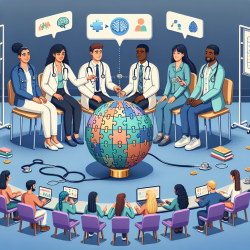Introduction
In the rapidly evolving world of artificial intelligence (AI), understanding the role of the public is crucial. The research article "Who are the publics engaging in AI?" sheds light on this topic, offering valuable insights for practitioners, especially those involved in education and therapy services. As a speech-language pathologist, understanding these dynamics can enhance your practice and improve outcomes for children.
Key Findings
The research identifies the multiplicity of ways in which publics are framed in AI literature. The terms used, such as "public," "citizen," and "stakeholder," carry different implications and affordances. This classification affects how these groups are perceived in terms of their ability to contribute to AI policy and knowledge production.
Implications for Practitioners
For practitioners in speech-language pathology, especially those providing online therapy services like TinyEYE, these findings can be transformative:
- Understanding Publics: Recognizing the diverse ways publics are defined can help tailor communication strategies to engage effectively with different groups.
- Incorporating AI Insights: By understanding how AI impacts public engagement, practitioners can better integrate AI tools in their therapy practices, enhancing service delivery and outcomes.
- Advocacy and Policy Influence: Being aware of the political and power dynamics in AI can empower practitioners to advocate for policies that support equitable AI deployment in educational settings.
Encouraging Further Research
While the research provides a comprehensive overview, it also highlights gaps in the literature. Practitioners are encouraged to delve deeper into these areas, exploring how AI can be leveraged to improve educational outcomes and therapy practices. Engaging with ongoing research can also keep practitioners at the forefront of technological advancements.
Conclusion
Understanding the publics engaging in AI is not just an academic exercise; it has practical implications for improving educational and therapeutic outcomes. By integrating these insights into practice, speech-language pathologists can enhance their services and advocate for more inclusive and effective AI policies.
To read the original research paper, please follow this link: Who are the publics engaging in AI?










